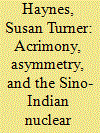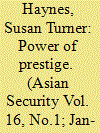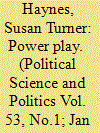| Srl | Item |
| 1 |
ID:
171172


|
|
|
|
|
| Summary/Abstract |
While most contemporary analyses of South Asian nuclear dynamics acknowledge the presence of a strategic triangle between the region’s three nuclear players, the primary focus usually remains on the rivalry between India and Pakistan. Discussions of Sino-Indian relations remain limited. This is likely attributed to the stability in the two countries’ relations, yet it is worth asking why this stability exists and whether it is likely to continue in the future. Although China and India have an acrimonious relationship, their asymmetric nuclear capabilities and threat perceptions mitigate the danger of a traditional security dilemma. India may perceive China’s nuclear aggrandizement to be a security threat, but the same is not true of China, which has a vastly superior nuclear force and is largely shaping its nuclear-force structure in response to the threat it perceives from the United States. This dynamic makes a serious conventional or nuclear conflict highly unlikely.
|
|
|
|
|
|
|
|
|
|
|
|
|
|
|
|
| 2 |
ID:
170973


|
|
|
|
|
| Summary/Abstract |
The majority of the nuclear proliferation literature is dedicated to understanding why states acquire nuclear weapons. While this question remains important, it is also advantageous to push beyond this inquiry to ask what motivates a state’s nuclear decisions after acquisition. Recent research indicates that a state’s nuclear force structure is heavily influenced by its threat environment. But what explains decisions relating to specific nuclear weapon systems? If security is a sufficient explanatory variable, then why would a state pursue nuclear weapons with high development and production costs but relatively low security gains? Using China as a case study, this article explores the power of prestige in explaining such decisions.
|
|
|
|
|
|
|
|
|
|
|
|
|
|
|
|
| 3 |
ID:
171293


|
|
|
|
|
| Summary/Abstract |
One of the most alarming trends of the past decade has been the rise in authoritarianism and the growing support of strongman politics among citizens of democratic regimes. College instructors have a unique opportunity to challenge such thinking at a time when many of their students are still forming their political beliefs. Using a game, instructors not only can show students the perils of authoritarianism, they also can potentially expand students’ appreciation of democracy. This article describes a game suitable for this purpose. Students take on the role of workers, soldiers, and rulers in a military dictatorship to learn about the “guns-and-butter tradeoff” and authoritarian uncertainty.
|
|
|
|
|
|
|
|
|
|
|
|
|
|
|
|